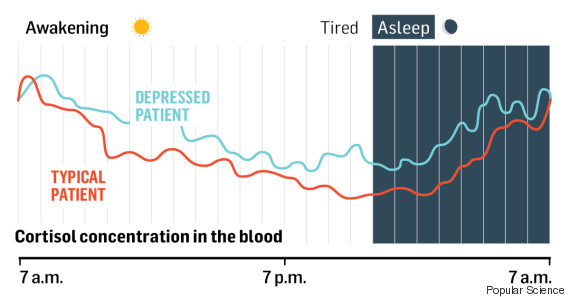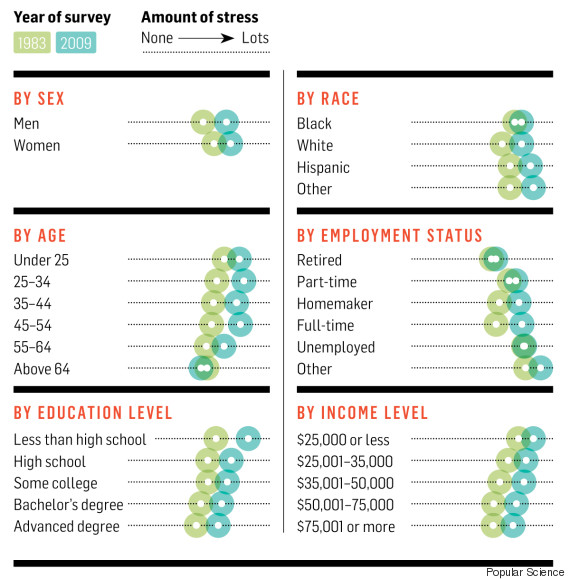Worried. Frantic. Dismayed. Under pressure. Stressed.
By now it's no secret that stress does more harm than good -- but that knowledge is hardly comforting in a world full of, well, stressors. Work, family life, finances, personal and societal pressures... there are a million reasons why we're so strung out, and they all can take a toll.
In an effort to gain a greater understanding of how this trepidation can affect our mind and body, Popular Science magazine took a closer look at the science behind worrying in this month's issue. Below are some of the biggest takeaways and statistics about how stress can shape our lives.
Stress goes beyond surface level.
These emotions don't just affect us on the outside. Stress can actually influence us on a cellular level and even mess with our biological systems. "Our bodies change our minds, and our minds can can change our behavior, and our behavior can change outcomes," Amy Cuddy, a Harvard University social psychologist, told the magazine.
Cortisol, also known as the stress hormone, can negatively affect our cardiovascular system, cells, metabolic system, nervous system and digestive system. Chronic worry may also increase our risk for heart attack, contribute to irritable bowl syndrome or could lead to changes in the brain.
It can have a huge impact on our well-being.
According to the magazine, 30 percent of U.S. adults say stress affects their physical health and 33 percent say it has an impact on their mental health. So how do we alleviate some of the damage? Try starting with a good laugh. Research shows a little giggle releases endorphins from the brain and can improve your mood.
Extreme stress can also wreak havoc on your sleep.

As the infographic above shows, cortisol tends to follow its own natural rhythm, spiking in the morning and then again overnight. This can be a particularly problematic for those who have stress-related mental health disorders. According to the National Institutes of Health, people with depression have abnormally high levels of cortisol in the body, which may negatively impact body cycles -- including sleep, the magazine reported.
You're not the only one who's stressed.

A study conducted by researchers at Carnegie Mellon University found that our stress levels have steadily increased over the years -- but the good news is, our worry tends to decrease with age, as the chart above shows. Financial concerns are also a major influence on how stressed we feel.
These kinds of results seem to be pretty universal across the board. According to the American Psychological Association's 2015 Stress in America Survey, money is the biggest contributor to stress. Women are also more stressed out than men.
There are easy ways to cope.
These statistics may sound dismal, but there is a bright side: Managing these emotions is entirely in our control. In fact, mitigating your stress may be as simple as adjusting your stance. Columbia University researchers found that those who sat in expansive positions with their arms and legs spread out for two minutes saw lower levels of the stress hormone than those in more tighter poses, according to Popular Science.
Research also shows socializing, exercising and adopting a meditation practice can also help ease tension. Looking for more tips? Check out this list of ideas.
Acute stress is one thing, but chronic worrying could be a sign of bigger health issues. Caring for your mental health is just as vital as prioritizing your physical health. If your stress is starting to regularly affect your daily life -- which may include physical symptoms or loss of joy in things you once found pleasurable -- you may want to consider seeking more professional routes of treatment.
Check out Popular Science for more on the science of stress and what to do about it.
